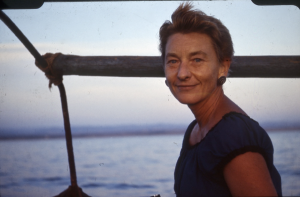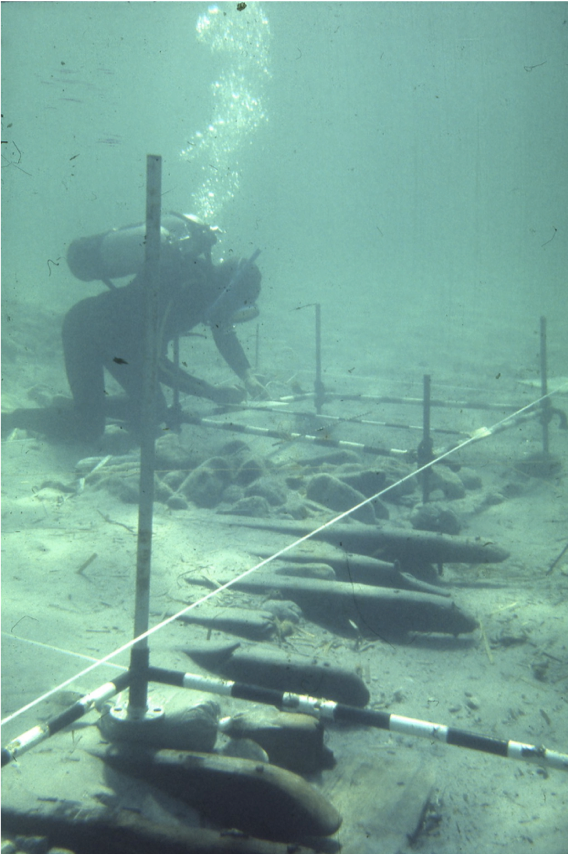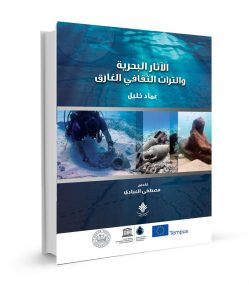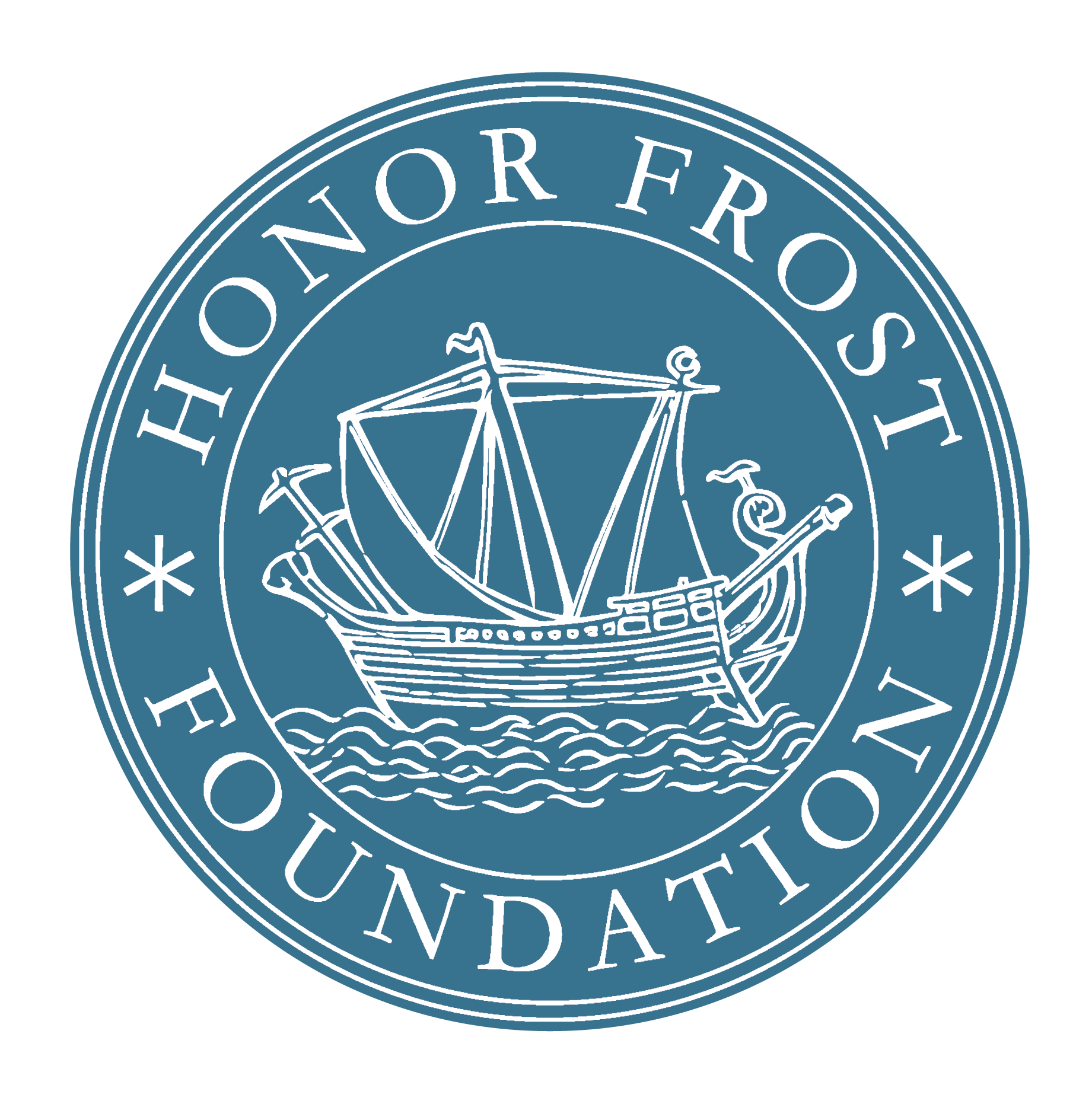Other Publication Projects
‘Writing Honor: Archaeology, History and (Auto)Biography’.
The aim of the Writing Honor project is to explore the history of maritime archaeology through the prism of Honor Frost’s work and its legacies.

Honor influenced the development of both maritime and eastern Mediterranean archaeology, yet she does not feature centrally in the public narratives surrounding archaeology’s disciplinary history. The project aims to address that gap and assess the significance of her contributions.
The project will produce both a diverse suite of scholarly biographical writing on Honor and a history of maritime archaeology volume: Writing Honor, Writing Maritime Archaeology: People, Politics and Practice.
As part of this a pilot project ‘Writing Honor: The Levant and the History of Archaeological Ideas about Seascapes’ was undertaken from May 2017-March 2018. This project traced Frost’s work on submerged sites off the coast of the Levant and its influence on the development of maritime archaeological ideas about seascapes.
The research undertaken by Dr Jesse Ransley and Dr Crystal El Safadi included archival research, interviews, conference and site visits.
The Story Map which visualises Honor’s archaeological career was also produced as part of the pilot project.
The pilot project included recommendations for revisions to the ‘Writing Honor’ Project, the project is currently on hold as a decision is made by the Foundation trustees about the next steps.
Researchers: Dr. Claire Calcagno and Dr. ElenaFlavia Castagnino Berlinghieri
 The Second Life of a Phoenix recounts in Honor Frost’s own words the “rebirth of a creature emerging from waves, not flames.” In her unfinished book manuscript Frost relates the story of how she first came to Sicily, how her archaeological team discovered the Punic shipwreck near Marsala in 1971, and the experiences over subsequent years of excavating, conserving and displaying the ship remains. She also provides historical context to the ship’s demise as well as to Anglo-Sicilian collaborations in recent centuries.
The Second Life of a Phoenix recounts in Honor Frost’s own words the “rebirth of a creature emerging from waves, not flames.” In her unfinished book manuscript Frost relates the story of how she first came to Sicily, how her archaeological team discovered the Punic shipwreck near Marsala in 1971, and the experiences over subsequent years of excavating, conserving and displaying the ship remains. She also provides historical context to the ship’s demise as well as to Anglo-Sicilian collaborations in recent centuries.
Under the auspices of the Honor Frost Foundation, Dr. Calcagno and Dr. Castagnino Berlinghieri (who found the book materials among Frost’s papers in London a few years ago) are editing Frost’s original manuscript and notes to publishable form, and translating the manuscript for bilingual publication in English and in Italian.
Frost worked for a number of years in Sicily with the essential help of the local Marsalese community and with underwater archaeologists who shared their often experimental expertise in maritime excavation and hull conservation techniques. In addition to the difficulties of managing a complex archaeological project in a region with relatively modest amenities at the time, Frost contended with an increasingly intractable combination of local and national bureaucratic hurdles over the course of her work on the Punic ship.
In 1981 Frost’s scholarly final project report Lilybaeum was published through the Accademia Nazionale dei Lincei in Rome. Likely shortly afterwards, she began work on a book intended for a popular audience, titled The Second Life of a Phoenix. Portrait of a Punic Ship Resurrected in a Sicilian Town. She appears to have written much of her book during the early 1980s, but abandoned it in 1986. It was resurrected a decade later, only to suffer a second demise very shortly afterwards. Much like the mythical bird that Frost chose to symbolize the entire project, the history of Frost’s Phoenix manuscript reflects the vicissitudes of the ancient ship itself.
The Phoenix manuscript remained unfinished and unknown until early 2013, when it was discovered fortuitously by Calcagno and Castagnino Berlinghieri among Frost’s papers. The 50,000-word text comprises seven completed chapters; other associated documents include outlines and notes for several additional chapters. In addition to curating and translating these materials, the editors will contribute background content to the published volume to locate her book within its broader historical, and contemporary, contexts.
Anyone who has had the pleasure of reading Frost’s 1963 book Under the Mediterranean: Marine Antiquities is already well aware of her gift with prose; the Phoenix manuscript is equally perceptive, erudite, accessible and amusing. The upcoming edited publication will offer new perspectives on Frost’s life and work and bring her Sicilian chronicles to a wide audience. It will also provide unique insights into the real import of this seminal and pioneering excavation, and its significance to the history of archaeology.
Image – Honor Frost working on the hull of the Punic ship in 1972. Image copyright the Honor Frost Archive.
 The world of maritime archaeology has undoubtedly changed significantly since Honor Frost wrote her seminal volume, Under the Mediterranean (1963). A milestone in the development of the subject in the Mediterranean came when in 1985 a symposium series began in Greece with the theme: TROPIS, International Symposium on Ship Construction in Antiquity. TROPIS soon became a meeting point for maritime archaeologists, working mainly (but not exclusively) in the Mediterranean, who presented papers on diverse research themes, including shipbuilding, ships and boats, ports and harbours, navigation and seafaring.
The world of maritime archaeology has undoubtedly changed significantly since Honor Frost wrote her seminal volume, Under the Mediterranean (1963). A milestone in the development of the subject in the Mediterranean came when in 1985 a symposium series began in Greece with the theme: TROPIS, International Symposium on Ship Construction in Antiquity. TROPIS soon became a meeting point for maritime archaeologists, working mainly (but not exclusively) in the Mediterranean, who presented papers on diverse research themes, including shipbuilding, ships and boats, ports and harbours, navigation and seafaring.
The last TROPIS conference took place on Hydra, in 2008. Honor was part of this meeting as she had been, with one exception, in every previous meeting. Since then TROPIS had not been followed up by any other Mediterranean maritime archaeological forum, and yet the discipline continued to develop as more and more papers with maritime themes were presented in other archaeological conferences of more general interest. In other words, it seems that maritime archaeology has come of age and the 21st century finds it much better integrated into the world of Archaeology than ever before. However, it was felt that it was time to provide a forum for maritime archaeologists working in the Mediterranean to regroup and to re-engage with the early TROPIS principles: to communicate more widely with others working in the region underwater, on the coasts, and on the land, and to share new finds, methodologies and ideas, including landscapes, trade, connectivity, scientific analysis, cultural management and new technological developments.
Sadly, Honor Frost, one of the pioneers of Mediterranean maritime archaeology, is no longer with us. Her legacy, however, lives on not only in terms of the significant contributions she made to the field in terms of her research, but also in her creation of another milestone in the history of the maritime archaeology, the Honor Frost Foundation (HFF). Since 2011, the HFF has made a dramatic difference, particularly important during a period of financial and political instability, to the growth of maritime archaeology in the region.
The 28th October 2017 marked 100 years since Honor Frost was born in Cyprus. To mark this event, it was decided to celebrate the centenary of her birth, to honour her work and that of her Foundation, by organising an international conference on Cyprus. It was held over four days and hosted at the University of Cyprus, Nicosia. A fifth day was dedicated to visiting some of the important coastal archaeological sites of Cyprus, particularly the pre-Classical harbours that were the main focus of Honor’s research. Participants were also invited to sail on the replica Kyrenia Liberty. The conference was largely supported by the HFF and further details can be found here.
Full volumes of the proceedings of the Tropis Conferences I-VII can be found here. Work is also being carried out to begin a project to publish TROPIS VIII, IX, & X, details will be added shortly.

- Funding has allowed the editor to attend international conferences (ApConf, ISBSA, SHA, IKUWA, EAA) to engage directly with contributors, readers and subscribers.
- To encourage a worldwide readership, and new authors, the journal abstracts have been translated into Arabic, Spanish, and Chinese.
- A prize has been awarded to one article a year in 2016, 2017, 2018 and 2019 (see https://www.nauticalarchaeologysociety.org/hff-ijna-open-access) to promote Open Access publication and take high-quality research to the widest possible readership.
- A webinar series based on articles published in the IJNA has been started to promote discussion and debate of recent research. These can also be viewed on YouTube here https://www.nauticalarchaeologysociety.org/ijna-webinar
 Prof Emad Khalil received an HFF award to publish the first ever handbook of maritime archaeology written in Arabic. This volume will no doubt be an invaluable text book for Arabic speaking students of maritime archaeology for years to come. The book is designed not only for students of archaeology and related subjects, but also for the general reader. It is an essential educational tool as well as a principal means for developing public awareness of the issues and practices of the field.
Prof Emad Khalil received an HFF award to publish the first ever handbook of maritime archaeology written in Arabic. This volume will no doubt be an invaluable text book for Arabic speaking students of maritime archaeology for years to come. The book is designed not only for students of archaeology and related subjects, but also for the general reader. It is an essential educational tool as well as a principal means for developing public awareness of the issues and practices of the field.
In 1965 Dr. Selim Morcos, an Egyptian former UNESCO staff member published the first book in Arabic on submerged cultural heritage named حضارات غارقة “Submerged Civilizations”. The book presented some of the important underwater archaeological discoveries that were made in the beginning of the 20th century, such the discovery of the Cape Galidonya shipwreck in Turkey, the ancient harbour of Pharos in Egypt and the submerged remains of Port Royal in Jamaica. It also shed light on the significance of the new field of underwater archaeology and encouraged Egyptian archaeologists in particular to get involved in it. However, since then, publication in Arabic on underwater cultural heritage has been very limited, which had an evident negative impact on the development of underwater archaeology in the Arab region at large. Nevertheless, during the past two decades, several maritime and underwater archaeological projects were carried out in a number of Arab states such as Egypt, Lebanon, Libya, Tunisia, Morocco, Kuwait and Oman, which demonstrated the need for Arabic literature in that discipline.
Hence, in an attempt to fill a gap in Arabic literature in that field of Maritime Arcaeology, Dr. Emad Khalil, professor of Maritime Archaeology at Alexandria University and former president of the ICOMOS International Committee on the Underwater Cultural Heritage published a book titled: الآثار البحرية والتراث الثقافي الغارق “Maritime Archaeology and Underwater Cultural Heritage”. The book was published with the support of the Honor Frost Foundation and the EU-TEMPUS program.
The book aims to introduce Arabic readers to the different aspects of exploring, preserving and presenting maritime and underwater archaeological resources. The book addresses both specialists and the general readers interested in underwater archaeology. Hence, it broadly covers a number of key issues related to the theoretical and practical foundations of maritime archaeology. This will certainly be a big contribution to the ratification and proper implementation of the UNESCO 2001 Convention on the Protection of the Underwater Cultural Heritage in the region.
For more information and enquiry on the book, please contact the author on: emadkhalil@hotmail.co.uk.

